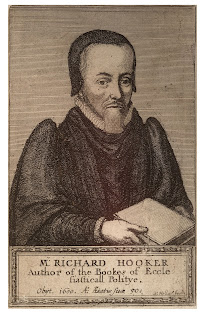This final extract from Mant's
1842 Visitation Charge offers a quite beautiful depiction of Old High piety. It follows from Mant challenging evangelical clergy who were organising for the purposes of agitation and campaigning. Against such disorder, disturbing the Church's peace, he points to Hooker, quoting from Walton's
Life:
And surely a parochial clergyman were better employed at home, serving God and waiting upon his people, in the quiet and unobtrusive walk of his legitimate and prescribed ministrations, and, like the venerable Richard Hooker, "as he expressed the desire of his heart, being free from noise, and eating his bread in privacy and quietness," than in seeking abroad the means of feeding the morbid appetite of an inordinate, indiscreet, and indiscriminating zeal.
Then, for the very closing words of the Charge, Mant turned to the Lawes, invoking the peaceable, ordered vision which those volumes wonderfully and reverently expound:
in the magnificent language of the incomparable author of the Ecclesiastical Polity, with which I hasten to a conclusion, "Of law there can be no less acknowledged, than that her seat is the bosom of God; her voice the harmony of the world. All things in heaven and earth do her homage, the very least as feeling her care, and the greatest as not exempt from her power; both angels, and men, and creatures of what condition soever, though each in different sort and manner, yet all with uniform consent, admiring her, as the mother of their peace and joy."
Now, yes, it might very well be pointed out that Hooker committed considerable time and effort to the writing of the Lawes. Might this not, then, be regarded as rather incompatible with "the quiet and unobtrusive walk" which should be the parson's manner of life? On the contrary, Hooker's Lawes were a defence of this vision and vocation, against a radical agitation which, with "wonderfull zeale" (Preface I.2), sought to undo the order, liturgy, and theological vision which shaped and safeguarded "the quiet and unobtrusive walk":
our hope is that the God of peace shall (notwithstanding mans nature too impatient of contumelious malediction) inable us quietlie and even gladly to suffer all things, for that worke sake which we covet to performe (Preface I.1).
In the words of Mant's illustrious predecessor in his see,
Jeremy Taylor, "the God of peace" is a title which "God newly took upon him in the New Testament, and glories in for ever".
Here lies something very close to the heart of the Old High piety, something profoundly attractive in a world and a church in an age when disorder, confusion, divisions, and harsh words dominate: that we "may pass our time in rest and quietness", a prayer echoing the call given by the Apostle, "that we may lead a quiet and peaceable life in all godliness and honesty" (1 Timothy 2:2).
Mant also here leads us to reflect on how we might understand the petition in the Litany that clergy should set forth "true knowledge and understanding of thy Word ... both by their preaching
and living". Part of this vocation in "
life and doctrine" (the Prayer for the Church Militant) is "the quiet and unobtrusive walk": not the way of agitation and dispute, but the peaceable path. This follows the Apostle's exhortation that the ordained should be "sober ... given to hospitality ... no striker ... patient not a brawler" (I Timothy 3:2f), "not soon angry ... no striker ... a lover of hospitality ... sober" (Titus 1:7f). The
Ordering of Priests calls those receiving the office of presbyter to this "quiet and unobtrustive walk":
Will you maintain and set forwards, as much as lieth in you, quietness, peace, and love, among all Christian people, and specially among them that are or shall be committed to your charge?
Likewise, the "quiet and unobstrusive walk" should also be evident in "preaching" and "doctrine". Here again we see the call given by Mant echoing that set forth by
Taylor:
Do not trouble your people with controversies: whatsoever does gender strife, the apostle commands us to avoid; and, therefore, much more the strife itself: a controversy is a stone in the mouth of the hearer, who should be fed with bread, and it is a temptation to the preacher, it is a state of temptation; it engages one side in lying, and both in uncertainty and uncharitableness; and after all, it is not food for souls; it is the food of contention, it is a spiritual lawsuit, and it can never be ended; every man is right, and every man is wrong in these things, and no man can tell who is right, or who is wrong.
Rather, as Taylor states
elsewhere, "Let the business of your Sermons be to preach holy Life, Obedience, Peace, Love among neighbours, hearty love, to live as the old Christians did, and the new should".
I cannot help but think that in a time in North Atlantic societies when Christianity is widely viewed as inherently sectarian, hostile to civic peace, discriminatory and authoritarian - and when some Christian voices encourage "an inordinate, indiscreet, and indiscriminating zeal" - Mant's "quiet and unobtrusive walk", echoing Hooker and Taylor, offers wise counsel for contemporary churches seeking to witness to the One who declared "my kingdom is not of this world".




Comments
Post a Comment